Historical Thoughts and Interpretations
In this blog Christian Basar analyses historical events or ideas one may encounter in the historiographical field. Though this podcast will cover many different topics, Basar’s main interests lie in military and Russian history. Thanks to Zoxo for the great logo design! Find his work on Instagram and Twitter @zoxonline
Episodes
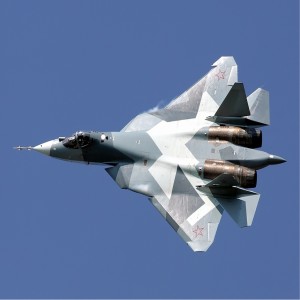
Friday Jul 03, 2020
Strategic Thoughts: The Syrian Civil War and the Russian Arms Trade
Friday Jul 03, 2020
Friday Jul 03, 2020
Russia has been actively involved in the Syrian Civil War since September 2015. During its campaign there, the Russian military has reportedly been able to improve old weapons systems and test new ones. How much has the mission affected Russia's arms sales to other countries? Here is a quick analysis and some "hot takes" on this question.
Music from https://filmmusic.io"Deliberate Thought" by Kevin MacLeod (https://incompetech.com)License: CC BY (http://creativecommons.org/licenses/by/4.0/)
Image credit: Maxim Maximov on Wikipedia.
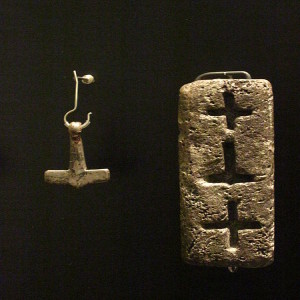
Saturday Jun 06, 2020
Preaching to the Northern Nations: The Christianization of the Norse Lands
Saturday Jun 06, 2020
Saturday Jun 06, 2020
The Christianization of Scandinavia did not happen quickly. This was a process rather than a quick event. And during this process, the old traditional Norse religion and new faith interacted in ways that blurred the many differences between them. “Pure Christianity” had a hard time spreading in this environment, and the Christians took a number of actions to help their faith grow. These actions included legislation and putting Christian beliefs into a Norse context. In addition to looking at these conversion methods, we will also talk about how Christianity appeared in the Norse sagas after conversion.
The thumbnail image shows a soapstone mould that could help create both cross and Thor's Hammer pendants. From Wikipedia page. Credit: Ktp72.
Music from https://filmmusic.io"Deliberate Thought" by Kevin MacLeod (https://incompetech.com)License: CC BY (http://creativecommons.org/licenses/by/4.0/)
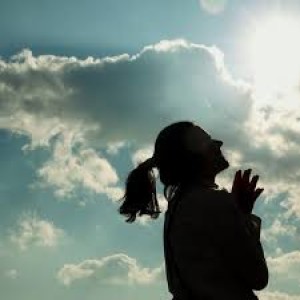
Saturday May 23, 2020
Psychology of Faith, Part 4: A Personal Definition of Faith
Saturday May 23, 2020
Saturday May 23, 2020
In this final episode of our "Psychology of Faith" series, we will be talking about definitions of faith but also about how faith is manifested in a believer. Is faith part of "nature" or "nurture?" How is faith "lived?" Building upon previous episodes' points about Christianity, this episode shows that the Christian concept of faith is more than just a "belief in something." It also encourages action and change in a believer.
Music from https://filmmusic.io"Deliberate Thought" by Kevin MacLeod (https://incompetech.com)License: CC BY (http://creativecommons.org/licenses/by/4.0/)
Picture credit: WomansDay.com
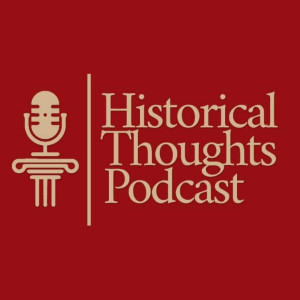
Sunday May 17, 2020
Psychology of Faith, Part 3: Mankind's Response to Revelation
Sunday May 17, 2020
Sunday May 17, 2020
How does humankind respond to revelation or the idea of a divine being? In this, the third part of our "Psychology of Faith" series, we focus on the views of Christianity to explain the possible responses to the idea of God: atheism, the worship of nature, and a life of faith on God. Ideas from theologians Augustine and Thomas Aquinas about man's choice between a Creator and Creation will be used to explain these responses.
Music from https://filmmusic.io"Deliberate Thought" by Kevin MacLeod (https://incompetech.com)License: CC BY (http://creativecommons.org/licenses/by/4.0/)

Tuesday May 05, 2020
Psychology of Faith, Part 2: Faith and the Intellect
Tuesday May 05, 2020
Tuesday May 05, 2020
What relationship does faith have with the intellect? Does religion truly try to engage with the rational mind as Thomas Aquinas, John Calvin, and Alvin Plantinga would suggest? Or is the "F&M Complaint" from Sigmund Freud and Karl Marx correct in asserting that faith needs a "badly aimed intellect?" We will look at some of these views in this podcast, as well as the consequences of the faith-intellect relationship.
This is the second episode of a four-part miniseries about the Psychology of Faith.
---------------
Music from https://filmmusic.io"Deliberate Thought" by Kevin MacLeod (https://incompetech.com)License: CC BY (http://creativecommons.org/licenses/by/4.0/)

Thursday Apr 30, 2020
Psychology of Faith, Part 1: Psychology of Faith or Just Faith?
Thursday Apr 30, 2020
Thursday Apr 30, 2020
This episode is the first of a four-episode miniseries about the psychology of faith. In this first installment, we will look at the relationship between psychology and faith. Are they compatible? Can psychology answer every question? To help answer this, we will look at the work of 13th-century theologian Thomas Aquinas as well as modern psychologists such as W.W. Meissner.

Tuesday Apr 21, 2020
"Gateway to the Peace:" A Short History of Chetwynd, B.C.
Tuesday Apr 21, 2020
Tuesday Apr 21, 2020
Chetwynd is a town of about 3,000 people in the British Columbia Rockies. Over the town's history, the area has been a base for fur, lumber, oil, and other industries. Known as Little Prairie until the 1959, Chetwynd has also acted as a hub for nearby communities and projects in the B.C. Peace Region. This project was a personal interest to me, as I grew up a half away from Chetwynd.
CHET TV's documentary "Chetwynd International Chainsaw Carving Championship The Carving Dream:" https://www.youtube.com/watch?v=u3zIWqSaAV0
Intro music from https://filmmusic.io"Deliberate Thought" by Kevin MacLeod (https://incompetech.com)License: CC BY (http://creativecommons.org/licenses/by/4.0/)
Photo by Christian Basar, 2019

Tuesday Mar 24, 2020
Tuesday Mar 24, 2020
The Teutonic Knights took part in crusades against pagan Prussia and Lithuania in the 13th and 14th centuries. After Lithuania converted to Catholicism and made an alliance with Poland, the German crusader order eventually fell to insignificance. However, the Teutonic Knights' legacy lived on in the German imagination, being envisioned in the 18th century as a proto-German empire and gaining a place in Adolf Hitler's Nazi ideology in the 20th. This brief survey will look at how the German crusaders left their mark on the Baltic region.
Music from https://filmmusic.io"Deliberate Thought" by Kevin MacLeod (https://incompetech.com)License: CC BY (http://creativecommons.org/licenses/by/4.0/)
Episode Thumbnail: "Coat of arms of the Teutonic Order" uploaded to Wikipedia by Madboy74

Saturday Feb 22, 2020
The Development of Holy Russia: A Governmental and Religious Narrative
Saturday Feb 22, 2020
Saturday Feb 22, 2020
The "Holy Russia" ideology developed over the centuries since Rus' conversion to Byzantine Christianity in the year 988. Various factors were responsible for the imagination of Russia as a holy place, which was eventually centered around Muscovy. These factors included a strong church-state codependency in the Byzantine tradition, Constantinople's adherence to the Florentine Union with the Catholic Church (and thus perceived apostasy), and Byzantium's fall to the Ottoman Turks very shortly after. The "Third Rome" was a related moniker for Russia, which suggested that Muscovy was the final true Christian realm. This podcast will look at "Holy Russia" in action at various points in Russian history, including the "raskol'," during which Russian Orthodox Christianity split into two religious factions.
Special thanks go to Professor Andrew Gow, for whose course I originally wrote a paper on which this podcast was based. His advice was very helpful during the research portion of that work.
Music from https://filmmusic.io"Deliberate Thought" by Kevin MacLeod (https://incompetech.com)License: CC BY (http://creativecommons.org/licenses/by/4.0/)

Wednesday Jan 15, 2020
Strategic Thoughts: Russia's Campaign in Syria: Background, Motivations, and Results
Wednesday Jan 15, 2020
Wednesday Jan 15, 2020
Russia's military intervention in the Syrian Civil War since September 2015 has been one of the most important turning points in that conflict. In this episode we will look at some of the history behind Russo-Syrian relations, the Kremlin's reasons for getting involved in the Syrian Civil War, and some of the benefits that Russia has gained from the first major military deployment outside of the former Soviet Union's territory.
-------Music from https://filmmusic.io"Deliberate Thought" by Kevin MacLeod (https://incompetech.com)License: CC BY (http://creativecommons.org/licenses/by/4.0/)

Monday Aug 12, 2019
The Memory of Masada
Monday Aug 12, 2019
Monday Aug 12, 2019
Masada was an ancient fortress in which, during the First Jewish Revolt against the Roman Empire, "Sicarii" rebels committed suicide in 73 A.D. Though Masada's defenders did not defeat their Roman besiegers, the fort became a great force in Jewish memory, especially in the context of Zionism and the creation of the state of Israel. In this podcast I will talk about the background of this memory, some of its uses in modern times, and also perceived problems with the narrative of Masada.
Intro/outro music from https://filmmusic.io"Deliberate Thought" by Kevin MacLeod (https://incompetech.com)License: CC BY (http://creativecommons.org/licenses/by/4.0/)
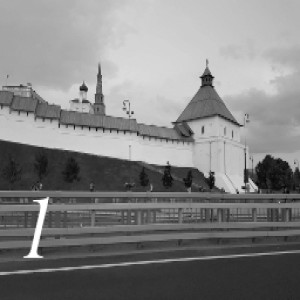
Wednesday Jul 10, 2019
Russian Cities History Project 2.1: Introduction to Kazan'
Wednesday Jul 10, 2019
Wednesday Jul 10, 2019
In this, the 20th episode of the podcast, I give an introduction to the first city in the Russian Cities History Project series. Kazan' is the capital of the Republic of Tatarstan, but in the past it was the centre of the Kazan' Khanate until Ivan the Terrible conquered it in 1552. Kazan' is a very interesting city, most notably due to its mix of Russian Muslim and Russian European cultures. This has caused some to describe Kazan' as a bridge "between East and West."
Music credits:
1) Introduction: Music from https://filmmusic.io; "Deliberate Thought" by Kevin MacLeod (https://incompetech.com);License: CC BY (http://creativecommons.org/licenses/by/4.0/)2) Гузель Уразова - Килче Килче (https://www.youtube.com/watch?v=fdEHUeMievc)

Tuesday Jun 11, 2019
Russian Cities History Project 1.3: Russia's Federal Structure
Tuesday Jun 11, 2019
Tuesday Jun 11, 2019
This episode continues my series about the history of Russian cities which I have visited. Here I introduce the Russian Federation's territorial structure, including its constituent "subjects" - republics, oblasts, krais, okrugs, and so on. This subject is important because when I discuss Russian cities in this series, I will also talk about the subjects of which they are part. Thus, it will be helpful to understand how these subjects fit into the Russian system.
Update June 13, 2019: I wish to clarify something that I might not had made clear in this episode. This point is about the former Russian Soviet Federal Socialist Republic's (RSFSR) federal structure during the Soviet era. In the episode I mentioned that the RSFSR contained within it some Autonomous Soviet Socialist Republics (ASSRs), such as the Tatar ASSR. I will clarify by adding the fact that this was not the only type of federal subject within the RSFSR. Just like in the modern Russian Federation, the RSFSR also contained oblasts, in addition to the ASSRs.

Friday May 17, 2019
Russian Cities History Project 1.2: My Impressions of Traveling in Russia
Friday May 17, 2019
Friday May 17, 2019
In this episode I talk about my travels in Russia. I will discuss some of my impressions, experiences, and the things I saw while I was taking a voyage to the "Motherland." This episode is meant to create a context for the upcoming Russian City History Series I will be posting. Listen to hear about my interactions with Russian people, train travel, and summaries of how I felt about each city I visited.
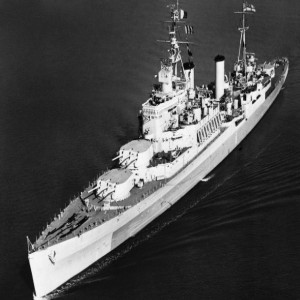
Monday Apr 15, 2019
Canada in the Pacific Theatre of World War II
Monday Apr 15, 2019
Monday Apr 15, 2019
Canada focused most of its war effort in the European Theatre of the Second World War. However, Canadian troops, pilots, naval personnel, and even fishermen also served in the Pacific Theatre against the Japanese Empire. This episode gives a summary of Canada's contributions to the Battle of Hong Kong, the Alaska campaign, West Coast patrols, and the closing days of World War II.
Photo: This is a picture of the HMS Uganda, which was eventually transferred from British to Canadian service, when its prefix was changed to HMCS. Photo from the Imperial War Museum, via Wikipedia.

Sunday Mar 31, 2019
Strategic Thoughts: The Military Reforms of Gustavus Adolphus
Sunday Mar 31, 2019
Sunday Mar 31, 2019
In 1630, during the Thirty Years' War, Sweden's King Gustavus Adolphus sent his new army into modern Germany to save the Protestant religion. In addition to discussing some of the background to Adolphus' campaign, this episode will focus on the reforms that made Sweden's military of the time a formidable fighting force.
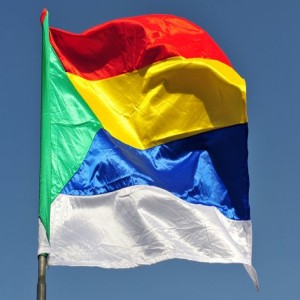
Sunday Feb 17, 2019
"Mount Lebanon:" A Conversation about the Druze People
Sunday Feb 17, 2019
Sunday Feb 17, 2019
For this, the podcast's first interview episode, I sat down with my friend Kamal Takieddine. Kamal is originally from Lebanon, and he kindly shared his insights into the tradition and history of his people, the Druze. In this episode he talks about the Druze presence in the Levant, their culture, their contacts with Europe, and he also tells us where one can go to learn more.Apologies for the changes in sound quality throughout the episode. The changes occur at the following times:- 1:31- 2:07- 3:05 (at this point I had asked Kamal about his interest in Druze history)- 39:45Episode thumbnail shows the Druze flag, courtesy of World Atlas.

Sunday Feb 03, 2019
Russian Cities History Project 1.1: Series Announcement
Sunday Feb 03, 2019
Sunday Feb 03, 2019
In this episode I announce on a long-term project that will be appearing on the podcast. This project will discuss the histories of Russian cities which I have visited. The list of cities is (alphabetically):
- Kazan- Kirov- Moscow- Penza- Tambov- More!
Listen to the episode for the full list. And stay tuned as the episodes in this series are provided!

Friday Feb 01, 2019
Friday Feb 01, 2019
Despite previous anti-religious persecution, the Russian Orthodox Church became a valuable support for the Soviet state during the Great Patriotic War against Hitler's Germany. Though the Soviet Union and its atheistic system of government no longer exists, the modern Church memorializes the War as a fight for "Holy Russia." This memory of the war may seemingly contradict the legacy of Soviet oppression against Christians, but the idea of "Holy Russia" makes these memories compatible. The Orthodox remembrance of the war also involves politics, considering the faith's importance in Russia and the use of the Great Patriotic War as a politically legitimizing idea.
For a longer and more detailed episode on this same topic, please listen to Episode #8: "Holy War: Memory of the Great Patriotic War in the Russian Orthodox Church."
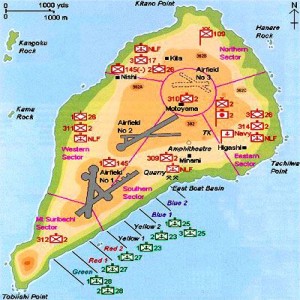
Tuesday Jan 15, 2019
Strategic Thoughts: The Battle of Iwo Jima
Tuesday Jan 15, 2019
Tuesday Jan 15, 2019
In this installment of the Strategic Studies series, we will look at the Battle of Iwo Jima. The Battle of Iwo Jima was fought from February 16 to March 26, 1945. One of the last battles of the Pacific Campaign between the United States and Japanese Empire, it was unique thanks to the Japanese commander's insistence on a non-traditional inland defense. In this podcast episode, Operation Detachment, which was the American plan to seize the island, will also be evaluated from a strategic point of view.
Episode thumbnail via Pinterest.
